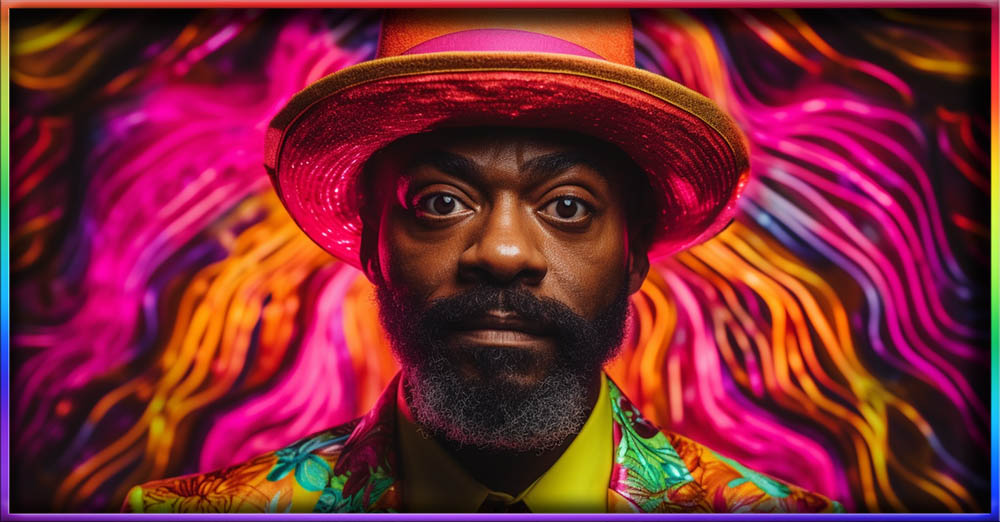
Embracing Consent
Empowering Relationships through Explicit Informed Consent

Consent is very important to me and I make certain to teach that importance in every single workshop, seminar, or course that I teach on hypnosis, trancework, or magick . . . particularly when I am teaching eroticatrance or erotic hypnosis.
Years ago, I was teaching an online certification course in erotic hypnosis and a couple who had signed up together approached me privately at the end of the program to thank me, particularly for hitting the concept of explicit informed consent multiple times throughout the course (seriously, I hit that point hard and often). They had previously taken a course from a very well-known (famous) hypnosis trainer who offered several courses in seduction and erotic hypnosis and they ended up walking out of his course because he not only taught techniques and principles that crossed the line into non-consensual areas and a number of his demonstrations crossed that line as well by starting with consensual material and then pushing through into areas that obviously became non-consensual with volunteers feeling they could not object because they would then be seen as slowing the pace of the class and the like. Hint, erotic hypnosis and seduction techniques must always be built upon a foundation of explicit informed consent.
In every adult and sexual relationship, the concept of explicit informed consent plays a crucial role in establishing a foundation of respect, communication, autonomy, and preventing harm. Consent, in its essence, is the voluntary agreement between individuals to engage in a specific activity, and explicit informed consent goes beyond mere acquiescence by emphasizing the importance of clear and unambiguous communication about desires, boundaries, and limitations. It requires active participation, understanding, and agreement from all parties involved.
I should point out that when I say “explicit informed consent”, I mean everyone involved in a relationship is aware of all the options and conditions. That is where it goes off the rails for some folks. I believe that if a married person and someone not married to that person opt to have sex outside the marital relationship then everyone involved needs to know this . . . so the unmarried person needs to know the married person is married before proceeding (too many creepy folks take that ring off and pretend to be unattached and that’s Creepy McCreeptastic or keep the ring on and then pretend to be in an unhappy relationship when they know they’ve no intention of ever leaving their comfortable spouse) so the unmarried partner should have full information and should be okay with it before proceeding. However, it does not stop there, the married person’s spouse should be fully informed and okay with it before proceeding. If your spouse is not okay with an open relationship then you either respect that person’s wishes or consider changing relationships but don’t be Creepy McCreeptastic. Explicit Informed Consent. IMNSFHO. In My Not So Fucking Humble Opinion. Let’s dig deeper.
The significance of explicit informed consent cannot be understated, especially in the context of adult and sexual relationships, where power dynamics, social expectations, and cultural norms can often complicate the dynamics of consent. By examining the multifaceted nature of explicit informed consent, we can delve into its various dimensions and explore how it fosters healthy relationships based on respect, trust, and autonomy.
Consent serves as the cornerstone of respect and communication in adult and sexual relationships. It provides a framework for establishing and respecting personal boundaries, ensuring that each individual’s agency and autonomy are upheld. When explicit informed consent is sought and obtained, it allows individuals to clearly define and communicate their desires, needs, and limits. This process not only promotes self-awareness and self-expression but also encourages active listening and understanding from all parties involved. By engaging in open and honest communication, sexual partners can navigate their desires and boundaries, negotiate mutually satisfying experiences, and build a foundation of trust and emotional safety.
Explicit informed consent is vital in safeguarding individual autonomy. Every person possesses the inherent right to self-determination, particularly in matters pertaining to their own bodies and sexual experiences. By seeking explicit consent, individuals recognize and respect each other’s autonomy, acknowledging that personal boundaries should never be violated or disregarded. This practice helps counteract power imbalances that may exist within relationships, preventing coercion or manipulation. It allows individuals to make informed decisions about their bodies, sexuality, and intimate experiences, fostering an environment of empowerment and mutual respect.
Explicit informed consent is instrumental in preventing harm and ensuring safety. It serves as a powerful tool in combating sexual assault, harassment, and other non-consensual activities. By obtaining affirmative and ongoing consent, individuals establish a clear framework that distinguishes consensual actions from those that are coercive or non-consensual. This helps create a culture of accountability, where every individual is responsible for respecting and valuing the boundaries and well-being of their partner(s). Additionally, explicit informed consent reduces the risk of misunderstandings, miscommunication, and crossed boundaries, thus minimizing the potential for physical and emotional harm within intimate relationships.
Explicit informed consent plays a vital role in adult and sexual relationships, promoting respect, communication, autonomy, and preventing harm. It establishes a foundation of trust and understanding, allowing individuals to express their desires and boundaries openly and honestly. By prioritizing explicit informed consent, we can foster healthy and consensual relationships that respect the autonomy and dignity of each individual involved.
Definition and Components of Explicit Informed Consent
Unveiling the Essence of Voluntary Agreement

To fully understand the importance of explicit informed consent in adult and sexual relationships, it is crucial to explore its definition and the key components that make it effective in promoting respectful and consensual interactions.
Explicit informed consent can be defined as a voluntary and conscious agreement between individuals to engage in a specific activity, based on a clear understanding of the nature of the activity, its potential risks, and the ability to freely make an informed decision. Unlike implied consent, which may be assumed or inferred from non-verbal cues or context, explicit informed consent requires explicit verbal or written communication to ensure mutual understanding and agreement.
The key components of explicit informed consent include voluntariness, capacity, comprehension, and communication. Voluntariness emphasizes that consent must be given willingly, free from any form of coercion, manipulation, or pressure. It involves the absence of threats, fear, or intimidation and requires that individuals have the freedom to accept or decline participation without negative consequences.
Capacity refers to an individual’s ability to make informed decisions. It implies that individuals must have the legal and mental capacity to understand the implications of their consent. This component takes into account factors such as age, cognitive abilities, intoxication, or any other condition that may impair an individual’s ability to fully comprehend the situation.
Comprehension highlights the need for clear and comprehensive understanding of the activity, its potential consequences, and any associated risks. It requires that individuals have access to relevant information and that all parties involved have a shared understanding of what is being agreed upon. This component ensures that consent is truly informed and based on a realistic assessment of the situation.
Communication is an essential component of explicit informed consent. It involves active and ongoing dialogue between individuals to express desires, boundaries, and limitations. Effective communication enables partners to negotiate and establish mutual agreement, allowing for a dynamic and consensual interaction. It also means that consent can be withdrawn at any time if one party no longer wishes to engage in the activity.
By understanding and upholding these components of explicit informed consent, individuals can establish a framework that promotes clear and unambiguous communication, respects personal autonomy, and mitigates the risk of harm or non-consensual actions. It shifts the focus from assumptions or presumptions to active engagement and dialogue, ensuring that consent is actively sought and obtained throughout the course of a relationship or sexual encounter.
Explicit informed consent in adult and sexual relationships encompasses voluntary agreement based on a clear understanding of the activity, its potential risks, and the ability to freely make an informed decision. Its key components of voluntariness, capacity, comprehension, and communication provide a robust framework for establishing respectful and consensual interactions. By embracing and prioritizing these components, individuals can foster relationships that are grounded in communication, trust, and mutual respect, setting the stage for healthy and consensual intimate experiences.
Promoting Respect and Communication
Building Trust and Intimacy through Consensual Connections

Explicit informed consent serves as a powerful catalyst for promoting respect and communication within adult and sexual relationships. It establishes a framework that encourages individuals to recognize and honor each other’s boundaries, desires, and limitations, fostering an environment of mutual understanding and empathy.
By actively seeking explicit informed consent, individuals have the opportunity to establish and communicate their boundaries and personal agency. This process allows them to assert their autonomy and define what is acceptable and comfortable for them in the context of their relationship or sexual encounter. Respect for these boundaries is crucial for creating an environment that values and upholds individual autonomy, ensuring that no one is subjected to activities they are uncomfortable with or did not consent to.
Explicit informed consent fosters mutual understanding and negotiation. By engaging in open and honest communication about desires, preferences, and expectations, partners can gain a deeper understanding of each other’s needs and establish a foundation of trust. Through ongoing dialogue, they can negotiate and navigate their desires, finding common ground and mutually satisfying experiences. This communication not only enhances the quality of intimate interactions but also strengthens the emotional connection between partners, promoting a sense of safety and security.
In addition to establishing boundaries and fostering understanding, explicit informed consent enhances trust and emotional safety within relationships. When individuals feel heard, respected, and supported in expressing their desires and limits, it cultivates an atmosphere of trust and vulnerability. This creates a safe space where partners can freely communicate their needs and concerns, knowing that their boundaries will be acknowledged and honored. Trust becomes the cornerstone of the relationship, enabling partners to explore and engage in sexual experiences with a shared understanding and reassurance that their well-being is paramount.
By promoting respect and communication, explicit informed consent also facilitates the development of healthy conflict resolution skills. When disagreements or conflicts arise, partners who have established a foundation of open communication are more likely to navigate these situations with empathy and understanding. They can address differences, negotiate compromises, and find mutually satisfying resolutions that respect the boundaries and preferences of both parties. This ability to handle conflict in a respectful and communicative manner strengthens the overall relationship and contributes to its long-term health and stability.
Explicit informed consent plays a pivotal role in promoting respect and communication within adult and sexual relationships. By actively seeking and practicing consent, individuals can establish clear boundaries, foster mutual understanding, and build trust and emotional safety. This emphasis on respectful communication creates an environment where partners feel valued, heard, and supported, leading to more satisfying and fulfilling relationships. Ultimately, the promotion of respect and communication through explicit informed consent paves the way for healthier, more equitable, and consensual interactions between individuals.
Safeguarding Individual Autonomy
Empowering Personal Choice and Boundaries

One of the paramount reasons why explicit informed consent is crucial in adult and sexual relationships is its role in safeguarding individual autonomy. Autonomy refers to the inherent right of individuals to make decisions about their own bodies, desires, and boundaries. By prioritizing explicit informed consent, individuals actively affirm and uphold this fundamental aspect of human dignity.
Recognizing the right to self-determination, explicit informed consent empowers individuals to exercise control over their own bodies and sexual experiences. It asserts that each person has the agency to make informed decisions about their desires, boundaries, and participation in intimate activities. This acknowledgment of personal autonomy reinforces the principle that no one should be subjected to unwanted or non-consensual actions, and it sets the stage for relationships that prioritize and respect individual boundaries.
Implicit in the concept of safeguarding autonomy is the need to counteract power imbalances and coercion. Power dynamics can exist in various forms within relationships, such as differences in age, social status, economic standing, or gender. These imbalances can create situations where one partner exerts undue influence or pressure on the other, compromising the ability to give free and voluntary consent. By seeking explicit informed consent, individuals are encouraged to examine and address these power differentials, ensuring that consent is obtained freely, without manipulation or coercion.
Explicit informed consent respects personal choices and preferences. It recognizes that individuals have diverse sexual orientations, identities, and desires, which may vary greatly from one person to another. By engaging in open communication and obtaining explicit consent, individuals affirm and honor these differences, celebrating the uniqueness of each person’s desires and preferences. This practice allows for a wide range of consensual experiences and relationships, promoting inclusivity, acceptance, and validation of diverse sexual expressions.
Explicit informed consent also promotes accountability and responsibility for one’s actions. When individuals actively seek and obtain consent, they demonstrate a commitment to respecting and valuing the autonomy and well-being of their partner(s). This accountability extends beyond the immediate context of the sexual encounter, influencing the overall dynamics of the relationship. It fosters an atmosphere of trust, openness, and respect, where individuals are conscious of their actions and the impact they have on their partner(s). By prioritizing consent, individuals actively contribute to creating healthy, equitable, and consensual relationships based on shared responsibility and mutual respect.
Explicit informed consent plays a critical role in safeguarding individual autonomy within adult and sexual relationships. It upholds the fundamental right to self-determination and allows individuals to make informed decisions about their bodies, desires, and boundaries. By countering power imbalances, respecting personal choices, and fostering accountability, explicit informed consent promotes relationships that honor and prioritize individual autonomy. It is through the safeguarding of autonomy that individuals can experience relationships that are grounded in respect, equality, and empowerment.
Preventing Harm and Ensuring Safety
Creating a Culture of Consent and Well-being

Explicit informed consent serves as a crucial tool in preventing harm and ensuring safety within adult and sexual relationships. It establishes a framework that helps individuals navigate boundaries, understand consent, and actively mitigate the risk of non-consensual activities or harm.
Addressing sexual assault and harassment is a significant aspect of preventing harm through explicit informed consent. By prioritizing clear and unambiguous communication, individuals can establish mutual understanding and agreement about the boundaries and limits of their interactions. This reduces the risk of unintentional boundary violations and minimizes the potential for non-consensual acts. It creates a culture of respect where partners actively seek and obtain consent, ensuring that all sexual activities are consensual and welcomed.
Explicit informed consent reduces the risk of misunderstandings and miscommunication. When individuals engage in open dialogue and seek explicit consent, they have a clearer understanding of each other’s desires, limits, and expectations. This clarity helps prevent situations where one person may unintentionally cross boundaries or engage in activities that the other party is uncomfortable with. By establishing a mutual understanding of consent, individuals can navigate their sexual encounters with a greater sense of security and reduce the potential for emotional or physical harm.
Creating a culture of consent and accountability is another important aspect of preventing harm through explicit informed consent. By actively promoting and practicing consent, individuals contribute to a broader societal shift in attitudes and behaviors. This shift challenges the normalization of non-consensual actions and emphasizes the importance of respecting personal boundaries and autonomy. Through education and awareness, individuals can actively advocate for consent-oriented policies and practices, fostering a culture that prioritizes the safety and well-being of all individuals in intimate relationships.
Explicit informed consent also encourages ongoing communication and check-ins during sexual encounters. This practice ensures that consent remains enthusiastic, continuous, and can be withdrawn at any time. It allows individuals to monitor their own comfort levels and empowers them to voice their needs or concerns. By engaging in regular communication and being attuned to each other’s responses, partners can actively ensure the well-being and safety of everyone involved.
Explicit informed consent plays a vital role in preventing harm and ensuring safety within adult and sexual relationships. It addresses the issue of sexual assault and harassment, reduces the risk of misunderstandings and miscommunication, and contributes to the creation of a culture of consent and accountability. By actively seeking and obtaining consent, individuals establish clear boundaries and foster an environment of respect, trust, and safety. Ultimately, the emphasis on preventing harm and ensuring safety through explicit informed consent paves the way for healthier, more consensual, and empowering intimate experiences.
Real-Life Lessons on the Importance of Consent
Case Study Examples

Examining case studies provides concrete illustrations of the significance of explicit informed consent in adult and sexual relationships. These examples demonstrate the real-world implications of consent-related issues and underscore the importance of promoting a culture of consent and communication.
Case Study: The Importance of Ongoing Consent
In a consensual relationship, Emma and James had previously engaged in sexual activities without any issues. However, during one encounter, James assumed that previous consent implied ongoing consent and engaged in a sexual act that Emma was not comfortable with. Emma, feeling violated, expressed her discomfort and confusion about the incident, leading to a breakdown in trust between them.
This case highlights the importance of ongoing consent and the need for explicit communication even within established relationships. Assumptions about consent can lead to misunderstandings and harm. By prioritizing ongoing consent and maintaining open dialogue, partners can continually ensure that their actions align with each other’s desires and boundaries.
Case Study: Negotiating Boundaries and Desires
In a new relationship, Alex and Sam explored their sexual preferences and boundaries through explicit informed consent. They engaged in detailed conversations about desires, boundaries, and any potential triggers. Through this open dialogue, they established a shared understanding of each other’s comfort levels, allowing them to navigate their sexual encounters with mutual respect and consent.
This case demonstrates the power of explicit informed consent in promoting respect and understanding. By engaging in comprehensive discussions and actively seeking consent, Alex and Sam built a foundation of trust and safety. Their commitment to ongoing communication allowed them to navigate their desires and boundaries, fostering a consensual and fulfilling sexual relationship.
Case Study: Consent and Power Dynamics
Maria and John had a significant age difference in their relationship, which created a power imbalance. John, aware of the potential for coercion, prioritized explicit informed consent to mitigate any potential harm. He actively sought Maria’s input, valued her boundaries, and made sure she felt comfortable expressing her desires and limitations. This emphasis on consent helped create a dynamic where Maria’s autonomy was respected, and their sexual experiences were consensual and mutually satisfying.
This case highlights the importance of consent in mitigating power imbalances within relationships. John’s commitment to seeking explicit consent actively challenged and counteracted the potential for coercion or manipulation. By acknowledging and addressing power dynamics, they fostered a relationship based on respect and equality.
Case Study: Recognizing Non-Verbal Cues
Sarah and Alex were engaged in a sexual encounter where Sarah’s body language indicated discomfort, but she did not explicitly voice her concerns. Alex, recognizing the significance of explicit informed consent, checked in with Sarah, asking if she was okay and if she wanted to continue. Sarah, feeling validated and supported, expressed her discomfort and chose to stop the activity. This case demonstrates the importance of being attuned to non-verbal cues and actively seeking verbal confirmation to ensure enthusiastic consent.
Case Study: Consensual Non-Monogamy and Negotiating Boundaries
In a consensual non-monogamous relationship, Lisa and Mark discussed their boundaries and expectations with potential additional partners. Through open and ongoing communication, they navigated the complexities of multiple relationships, ensuring that all parties involved were informed and consenting. This case highlights the importance of explicit informed consent within non-traditional relationship dynamics, where clear communication and negotiation of boundaries are crucial to maintaining consensual and ethical interactions.
Case Study: Addressing Intoxication and Consent
During a party, Adam and Sarah engaged in sexual activity while both were under the influence of alcohol. Recognizing the potential for impaired judgment, Adam sought explicit consent from Sarah multiple times throughout their interaction, ensuring that she was capable of providing informed consent. This case emphasizes the importance of acknowledging the impact of intoxication on an individual’s ability to give valid consent and the responsibility of the sober partner to prioritize clear communication and obtain explicit consent.
Case Study: Prioritizing Emotional Consent
Emma and David were in a committed relationship where David frequently pushed emotional boundaries by pressuring Emma into engaging in sexual activities she was not comfortable with. Emma, realizing the importance of emotional consent, expressed her feelings and set clear boundaries. David, respecting her autonomy, acknowledged his behavior and actively worked to create a safe and consensual environment. This case demonstrates that explicit informed consent encompasses not only physical boundaries but also emotional boundaries, highlighting the significance of open communication and respect for emotional well-being.
Case Study: Addressing Power Dynamics in the Workplace
Laura and Jason worked together in a professional setting, with Jason holding a senior position. Recognizing the power imbalance, Jason actively sought explicit informed consent when expressing romantic or sexual interest in Laura. This case emphasizes the importance of navigating relationships in a workplace setting and the need to address power differentials through clear communication and consent to ensure that no one feels coerced or pressured due to their professional circumstances.
Case Study: Respecting Boundaries in Long-Term Relationships
In a long-term relationship, Mark and Emily recognized the importance of ongoing consent and the need to continuously check in with each other. Despite their familiarity and history, they made a conscious effort to discuss boundaries and desires, ensuring that their sexual activities were always consensual. This case highlights that even in established relationships, explicit informed consent remains crucial to maintaining a respectful and consensual dynamic.
These additional case studies provide further insight into the importance of explicit informed consent in a variety of relationship dynamics. They underscore the significance of clear communication, negotiation of boundaries, and addressing power imbalances to promote consensual, respectful, and safe adult and sexual relationships. By analyzing these real-life examples, we gain a deeper understanding of how explicit informed consent can positively impact diverse relationship scenarios.
Legal and Ethical Considerations
Navigating the Intersection of Consent and Responsibility

Explicit informed consent carries significant legal and ethical implications in the realm of adult and sexual relationships. It serves as a cornerstone for establishing and upholding ethical standards and legal protections for individuals involved in intimate interactions. This section delves into the legal and ethical considerations surrounding explicit informed consent.
From a legal standpoint, explicit informed consent plays a vital role in defining and determining the boundaries of consensual interactions. In many jurisdictions, consent is a key factor in assessing the legality of sexual activities. Laws regarding sexual assault and rape rely on the presence or absence of consent to determine criminal liability. By seeking and obtaining explicit informed consent, individuals engage in behavior that aligns with legal frameworks, ensuring that their actions are consensual and lawful.
Explicit informed consent is essential in addressing issues of capacity and consent in situations involving vulnerable populations, such as individuals with disabilities, the elderly, or those in power-imbalanced relationships. Legal systems recognize the need for heightened protection and consent standards in these contexts. Explicit informed consent provides a framework that considers the unique circumstances and ensures that consent is freely given and fully understood by all parties involved, preventing exploitation and safeguarding the rights of vulnerable individuals.
Ethically, explicit informed consent is rooted in principles of respect, autonomy, and dignity. It recognizes the inherent worth and agency of each individual and promotes a relationship dynamic that prioritizes the well-being and consent of all parties involved. Ethical guidelines, such as those provided by professional organizations or medical associations, emphasize the importance of obtaining explicit informed consent in various contexts, including medical procedures, research studies, and intimate relationships.
Relationships can be enhanced and strengthened through explicit informed consent or destroyed when someone breaks trust by stepping into non-consensual areas. Honestly, like many folks, I had to learn some hard lessons early on and teach my students in ways so that they learn from my mistakes and from solid principles of full explicit informed consent.
Additionally, explicit informed consent contributes to the establishment of trust and transparency within relationships. It fosters an ethical framework that encourages open communication, honesty, and respect for personal boundaries. By engaging in explicit informed consent practices, individuals actively promote fairness, equality, and respect for the autonomy and dignity of their partners. Ethical considerations also extend to matters of confidentiality, where individuals have the responsibility to protect the privacy of personal information shared during the process of obtaining consent.
Moreover, explicit informed consent aligns with broader societal shifts towards the recognition of individual rights and bodily autonomy. It reflects a growing awareness of the importance of consent culture and the necessity of dismantling harmful attitudes and behaviors that perpetuate non-consensual actions. By prioritizing explicit informed consent, individuals actively contribute to the creation of a more inclusive, respectful, and equitable society.
Explicit informed consent holds significant legal and ethical considerations in adult and sexual relationships. From a legal standpoint, it establishes the boundaries of consensual interactions and plays a crucial role in addressing issues of capacity and vulnerability. Ethically, it upholds principles of respect, autonomy, and dignity, fostering transparent and consensual relationship dynamics. By adhering to the principles of explicit informed consent, individuals not only comply with legal frameworks but also actively contribute to the creation of a society that respects and upholds the rights and well-being of all individuals involved in intimate relationships.
Breaking Barriers to a Culture of Consent
Challenges and Misconceptions

While explicit informed consent is a crucial aspect of adult and sexual relationships, it faces various challenges and misconceptions that can hinder its implementation. Understanding these obstacles is essential to effectively promote and advocate for a culture of consent and communication.
One common challenge is the misconception that consent is a one-time event or that it can be assumed based on previous experiences. This belief undermines the importance of ongoing consent and disregards the dynamic nature of sexual interactions. Consent should be sought and given explicitly for each new activity or encounter, even within established relationships. Challenging this misconception requires education and awareness-raising efforts to emphasize that consent is continuous and can be withdrawn at any point.
Another challenge is the societal pressure to prioritize pleasure or the assumption that consent detracts from spontaneity or passion. This misconception creates a false dichotomy between consent and desire, suggesting that seeking explicit consent is cumbersome or unromantic. However, explicit informed consent can enhance intimacy, trust, and shared pleasure within relationships. By reframing the narrative to view consent as an integral part of pleasurable experiences, individuals can overcome this misconception and embrace consent as a positive and empowering aspect of sexual encounters.
Power imbalances within relationships also pose significant challenges to obtaining genuine consent. In situations where one partner holds more influence, such as in hierarchical workplace relationships or relationships with significant age differences, the potential for coercion or manipulation increases. Addressing power dynamics and fostering open communication becomes essential to ensure that consent is freely given and not influenced by external pressures. Educating individuals on recognizing and challenging power imbalances can help mitigate these challenges and promote consensual interactions.
Societal misconceptions and victim-blaming attitudes further complicate the concept of explicit informed consent. Victim-blaming narratives often place the burden on the survivor to prove non-consent, rather than holding perpetrators accountable for obtaining explicit consent. These harmful attitudes perpetuate a culture of silence and undermine the importance of consent. By challenging victim-blaming narratives and promoting a shift towards a culture of support and belief, society can overcome these misconceptions and foster a climate that prioritizes consent and accountability.
Additionally, cultural and contextual factors can influence the understanding and practice of consent. Societal norms, cultural expectations, and communication styles differ across communities, which can create challenges in navigating consent. Recognizing and respecting diverse perspectives and cultural contexts is crucial when promoting explicit informed consent. It requires a nuanced approach that encourages open dialogue, education, and understanding of various cultural perspectives on consent.
Explicit informed consent faces challenges and misconceptions that hinder its implementation in adult and sexual relationships. Overcoming these obstacles requires addressing misconceptions around ongoing consent, challenging the assumption that consent hinders pleasure, and confronting power imbalances within relationships. Additionally, combatting victim-blaming attitudes and considering cultural and contextual factors are necessary steps towards fostering a culture of consent and communication. By actively addressing these challenges, individuals and society can work towards creating a more inclusive, respectful, and consensual environment for all.
Education and Awareness
Equipping Individuals for Empowered Consent

Education and awareness play a pivotal role in promoting explicit informed consent within adult and sexual relationships. By equipping individuals with knowledge, skills, and resources, we can foster a culture that values consent, communication, and respect. This section explores the importance of education and awareness in promoting explicit informed consent.
Comprehensive and age-appropriate sex education is a crucial component of promoting consent and communication. By integrating consent education into school curricula, young people can develop a clear understanding of what consent entails and how to navigate consent in their relationships. Sex education should encompass discussions on boundaries, negotiation skills, recognizing non-verbal cues, and the importance of ongoing consent. Providing accurate information about sexual health, consent laws, and healthy relationships empowers individuals to make informed choices and fosters a culture that prioritizes consent.
Furthermore, community-based initiatives and campaigns can raise awareness about the importance of explicit informed consent. Workshops, seminars, and public forums can serve as platforms for discussions on consent, communication, and healthy relationships. These initiatives can address misconceptions, challenge societal norms, and provide individuals with practical strategies for seeking and obtaining consent. By engaging diverse audiences and encouraging open dialogue, these initiatives create opportunities for learning, sharing experiences, and promoting a culture of consent.
Media literacy also plays a significant role in shaping attitudes towards consent. Critically analyzing media portrayals of relationships and sexuality helps individuals recognize and challenge harmful narratives and stereotypes. By promoting positive and realistic portrayals of consent and communication in various forms of media, including movies, television shows, and music, we can reshape societal perceptions and expectations surrounding intimate relationships.
Collaboration with community organizations, advocacy groups, and healthcare providers is essential in promoting education and awareness of explicit informed consent. These partnerships can facilitate the development and dissemination of educational resources, workshops, and campaigns. Healthcare providers, in particular, can integrate discussions on consent into routine medical visits and provide information on sexual health, healthy relationships, and consent to their patients. By harnessing the expertise and influence of various stakeholders, we can reach a broader audience and create lasting change.
Online platforms and social media play a significant role in disseminating information and fostering conversations about consent. Utilizing these platforms to share educational resources, personal narratives, and practical tips can reach a wide audience and promote a culture of consent. Online campaigns, hashtags, and discussion forums create spaces for individuals to engage with consent-related topics, ask questions, and share experiences, fostering a sense of community and support.
Education and awareness initiatives are crucial in promoting explicit informed consent. By integrating consent education into school curricula, initiating community-based campaigns, promoting media literacy, and collaborating with healthcare providers and community organizations, we can equip individuals with the knowledge and skills to navigate consent and communication in adult and sexual relationships. Online platforms provide additional avenues for education and engagement. By investing in comprehensive education and raising awareness, we can foster a society that values consent, communication, and respect, ultimately creating safer and more fulfilling intimate relationships for all individuals.
Some Videos Worth Watching

Yes, you really can use eroticatrance or erotic trancework hypnosis work . . . to explore things sensual.
As far as hypnosis goes, I do quite a bit of work developing hypnotic processes to ecstatic trance results.
I am particularly interested in adapting traditional methods to contemporary hypnotic methods as well as in creating wholly original methods outside of the traditional model.
Here’s just a sampling of work I have done over the years to very good effect.
Let’s Talk About Consent
You can also see the video at https://www.youtube.com/watch?v=JGr7QbrrvQ0.
Tea and Consent
You can also see the video at https://www.youtube.com/watch?v=oQbei5JGiT8.
Consent eXplained for Donald Trump
You can also see the video at https://www.youtube.com/watch?v=g6o1eTHC99U.
This is just the tip of the iceberg as you might know from my videos and more. Of course, those wishing to explore even more may consider learning packages such as our ErosPsyMagick+ program at https://briandavidphillips.net/erospsymagickplus which is of particular interest as it has everything rolled into one comprehensive package . . . seriously it’s the whole trancework kit-n-kaboodle.
Shaping a Future of Respect and Empathy
The Power of Explicit Informed Consent

Explicit informed consent is a fundamental aspect of adult and sexual relationships, embodying principles of respect, autonomy, and communication. By clearly defining consent and its components, such as voluntariness, understanding, and communication, individuals can navigate intimate interactions in a consensual and ethical manner. Throughout this essay, we have explored the importance of explicit informed consent from various angles, including its definition and components, the promotion of respect and communication, safeguarding individual autonomy, preventing harm and ensuring safety, case study examples, legal and ethical considerations, challenges and misconceptions, and the role of education and awareness.
Explicit informed consent is a powerful tool for promoting respectful and equitable relationships. It acts as a safeguard against coercion, violation of personal boundaries, and harmful actions. By prioritizing open and honest communication, individuals create an environment that respects the autonomy and agency of all parties involved.
However, challenges and misconceptions persist in regard to explicit informed consent. Overcoming these obstacles requires challenging societal norms, addressing power imbalances, and combating victim-blaming attitudes. Education and awareness initiatives play a vital role in promoting a culture of consent and communication, emphasizing the importance of ongoing education, comprehensive sex education, community-based initiatives, media literacy, and collaborations with healthcare providers and advocacy groups.
By embracing explicit informed consent, individuals contribute to the creation of a society that values respect, autonomy, and consent in all facets of adult and sexual relationships. It is through these efforts that we can foster a culture that prioritizes the well-being, safety, and agency of all individuals, creating healthier, more fulfilling, and consensual relationships for everyone involved.
The importance of explicit informed consent cannot be overstated. It is a cornerstone of ethical and respectful relationships, ensuring that individuals have agency over their own bodies and choices. By recognizing and promoting the significance of explicit informed consent, we take a vital step towards creating a society where consent is the norm and where individuals can engage in relationships based on trust, communication, and mutual respect.
Frequently Asked Questions:
Explicit Informed Consent

Q: What is explicit informed consent?
A: Explicit informed consent refers to the voluntary, clear, and communicated agreement given by individuals engaging in adult and sexual relationships. It involves a mutual understanding of the nature of the activity, boundaries, and the right to withdraw consent at any point. .
Q: How is explicit informed consent different from implied or assumed consent?
A: Explicit informed consent differs from implied or assumed consent by emphasizing the necessity of clear and explicit communication regarding consent. Implied or assumed consent relies on assumptions or non-verbal cues, while explicit informed consent requires open dialogue and a conscious agreement. .
Q: What are the components of explicit informed consent?
A: Explicit informed consent consists of several components, including voluntariness (freely given without coercion), understanding (full comprehension of the activity and its potential consequences), and communication (clearly expressing one’s boundaries, desires, and limitations). .
Q: Why is respect and communication important in promoting explicit informed consent?
A: Respect and communication are vital in promoting explicit informed consent because they create an environment where individuals feel comfortable expressing their boundaries, desires, and limitations. Respectful communication allows for open dialogue, negotiation, and the establishment of clear expectations. .
Q: How does explicit informed consent safeguard individual autonomy?
A: Explicit informed consent safeguards individual autonomy by ensuring that individuals have the agency to make decisions about their bodies and experiences. It empowers individuals to exercise control over their boundaries, desires, and choices without external pressure or coercion. .
Q: What role does explicit informed consent play in preventing harm and ensuring safety?
A: Explicit informed consent plays a crucial role in preventing harm and ensuring safety by establishing clear boundaries and expectations. It helps to identify and prevent non-consensual or harmful behaviors, as well as facilitating communication about risks, limits, and preferences, thereby fostering a safe and consensual environment. .
Q: Can you provide some examples of case studies illustrating the importance of explicit informed consent?
A: Certainly! Some case study examples include instances where explicit informed consent was absent, leading to non-consensual acts, emotional harm, or legal consequences. These examples highlight the importance of obtaining explicit informed consent to establish consensual and respectful relationships. .
Q: What are the legal and ethical considerations surrounding explicit informed consent?
A: Explicit informed consent carries legal significance as it forms the basis for determining the legality of sexual activities and addressing issues of capacity and vulnerability. Ethically, it upholds principles of respect, autonomy, and dignity, fostering transparent and consensual relationship dynamics. .
Q: What are the challenges and misconceptions surrounding explicit informed consent?
A: Challenges and misconceptions surrounding explicit informed consent include the misconception that consent is a one-time event, societal pressure to prioritize pleasure over consent, power imbalances within relationships, victim-blaming attitudes, and cultural or contextual differences in understanding and practice of consent. .
Q: How can education and awareness initiatives promote explicit informed consent?
A: Education and awareness initiatives can promote explicit informed consent by integrating consent education into school curricula, conducting community-based campaigns, promoting media literacy, collaborating with healthcare providers and organizations, and utilizing online platforms for dissemination of information and fostering discussions. .
Q: How does explicit informed consent contribute to the establishment of healthier and more fulfilling relationships?
A: Explicit informed consent contributes to healthier and more fulfilling relationships by fostering open communication, trust, and respect. It creates an environment where individuals feel empowered to express their desires and boundaries, leading to mutual understanding, shared decision-making, and enhanced intimacy. .
Q: Does explicit informed consent detract from spontaneity or passion in intimate relationships?
A: No, explicit informed consent does not detract from spontaneity or passion. In fact, it enhances these aspects by establishing clear boundaries and facilitating open communication. Consent becomes an integral part of the experience, leading to a deeper understanding of each other’s desires and fostering a sense of trust and mutual respect. .
Q: How can society overcome challenges and misconceptions surrounding explicit informed consent?
A: Overcoming challenges and misconceptions requires education, awareness, and cultural change. Society can challenge misconceptions through comprehensive sex education, media literacy, addressing power imbalances, promoting supportive and non-victim-blaming attitudes, and recognizing and respecting diverse cultural perspectives on consent. .
Q: What are the benefits of embracing explicit informed consent in adult and sexual relationships?
A: Embracing explicit informed consent brings numerous benefits, including fostering respect, communication, and trust within relationships. It helps prevent non-consensual acts and promotes safety, autonomy, and agency for all individuals involved. By prioritizing explicit informed consent, we contribute to a culture that values consent and promotes healthier and more fulfilling adult and sexual relationships. .
Q: Where can I learn more about trancework practice by Brian David Phillips?
A: Of course, those wishing to explore even more may consider learning packages such as our ErosPsyMagick+ program at https://briandavidphillips.net/erospsymagickplus which is of particular interest as it has everything rolled into one comprehensive package . . . core skills, metaphysical magickal psychic, and eroticatrance ecstatic states.
You Can Learn More

If you would like to learn more about using hypnosis techniques, consult our Core Skills program and other products found in our online store at https://briandavidphillips.net/store (you may wish to check out our package programs for even more value).
Our ErosPsyMagick+ program at https://briandavidphillips.net/erospsymagickplus is of particular interest as it has everything rolled into one comprehensive package . . . core skills, metaphysical magickal psychic, and eroticatrance ecstatic states.
If you’re in Taiwan and interested in hypnosis, check the services page linked to in the top left sidebar. Not in Taipei? Check the store for recordings in the same menu area as well as links to lots and lots of info and goodies. Of course, browsing this site will bring you to a digital ton of positive resources on a wide variety of topics as well.
Live Trance and Prosper,
Brian David Phillips
Trance Wizard
www.BrianDavidPhillips.net/blog
Tarot Decks and More
https://www.makeplayingcards.com/sell/wakingdreams











